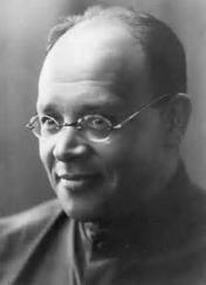 Last Saturday, 13 July, marked the 125th anniversary of the birth of the Odessan writer journalist and playwright Isaac Babel. The event may not have been cause for much celebration, but it was fittingly marked with an article in the Moscow Times and gives me an excuse to write again about this doyen of twentieth century Russian literature. Born in 1894 to a middle-class Jewish family in Odessa, present-day Ukraine, Babel was best known for his collection of Red Cavalry stories, drawn from his personal experience as a journalist with the Red Army in 1920, and his Odessa stories, featuring characters from his hometown, including the legendary gangster Benya Krik. It has been said that, “To read Babel is to experience the wild and often terrifying swings of Russian history”. Babel has also been called "the greatest prose writer of Russian Jewry" and is considered one of the luminaries of 20th-century Soviet literature. Babel’s career was supported by his friendship with the Russian Revolution’s leading literary light, Maxim Gorky. Babel moved from Odessa before the revolution to St Petersburg, where he lived illegally (as a Jew, he was restricted to the Pale of Settlement in the southwest of the country) to be close to Gorky, who began mentoring him in 1916 and published his early works in a literary magazine. The two would remain friends until Gorky’s death in 1936. Indeed, it was Gorky who urged Babel to become a journalist to gain more life experience in order to inform his writing, prompting him to enlist in the Soviet army as a war correspondent and propagandist. He was assigned to an army division in the Polish-Soviet War of 1920, where he witnessed scenes of horrific brutality, some of which would become the basis for his Red Cavalry stories. Observers have said the book’s depictions of violence contrasted jarringly with Babel’s gentle nature. His honest, explicit description of war diverged heavily from revolutionary propaganda and was the first exposure many Russian readers had to the realities of the war. After the war, Babel returned to Odessa, where he began work on a series of short stories that were later published as the Odessa Tales. The stories, narrated by an ironic version of Babel himself, describe the life of Jewish gangsters in an Odessa ghetto around the time of the October Revolution. The character of Benya Krik, has been referred to as one of the great anti-heroes of Russian literature. Babel wrote that Odessa was ‘the most charming city of the Russian Empire…a town in which you can live free and easy. Half the population is made up of Jews, and Jews are a people who have learned a few simple truths along the way…you might not be able to budge these Jews from their opinions but there’s a whole lot you can learn from them. To a large extent it is because of them that Odessa has this light and easy atmosphere.’ In the 1930s, Babel increasingly withdrew from public life as Stalin applied pressure on the Soviet intelligentsia. By the end of the decade he had fallen victim to Stalin’s purges. He was arrested in 1939 by the NKVD, a precursor to the KGB, on fabricated espionage and terrorism charges and taken to the infamous Lubyanka prison, the headquarters of the secret police in Moscow. His papers were confiscated and destroyed, among them half-completed stories, plays, filmscripts and translations. Babel was shot by firing squad in January 1940 following a brief, clandestine trial. His name and work were erased until 1954, when he was rehabilitated during Soviet premier Nikita Khrushchev’s ‘thaw’.
1 Comment
|
Keeping stories aliveThis blog aims to discuss historical events relating to the Jewish communities of Ukraine, and of Eastern Europe more widely. As a storyteller, I hope to keep alive stories of the past and remember those who told or experienced them. Like so many others, I am deeply troubled by the war in Ukraine and for the foreseeable future, most articles published here will focus on the war, with an emphasis on parallels with other tumultuous periods in Ukraine's tragic history. Archives
March 2024
Categories
All
|
 RSS Feed
RSS Feed
